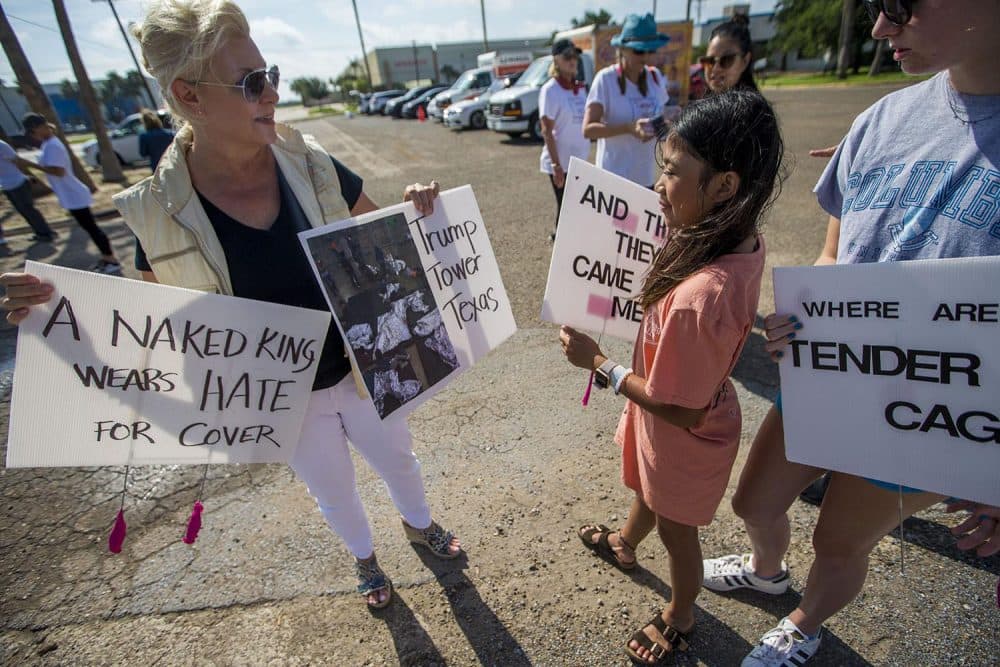Advertisement
If A System For Reunifying Separated Families Exists, Mass. Congressional Delegation Didn't See It
Resume
U.S. Congresswoman Katherine Clark and Congressman Michael Capuano have left the U.S.-Mexico border with more questions than answers.
The two Massachusetts representatives were part of a Democratic delegation that toured three federal immigration facilities in Texas over the weekend, trying to get a sense of how the Trump administration is planning on reuniting families separated as a result of the president's recent immigration policies.
Standing in front of a U.S. Customs and Border Patrol (CBP) processing center in McAllen, Texas, Clark described an "un-American" scene inside two of the facilities where unaccompanied migrant children and families are being temporarily detained.

She said that many people were sleeping on cement floors using silver, mylar sheets as blankets and described locked "cages" made of chain-link fencing.
The members of Congress also said that CBP agents working inside the facilities were unable to answer questions about the reunification process. Capuano said the federal agents on the ground are doing the best they can under the circumstances, and he places blame squarely on the shoulders of President Trump.
"The president claimed for a week that he couldn't do anything without congressional action and then somehow, miraculously, he did just that," Capuano said, referring to the president's executive order ending the same family separation policy that he himself created.
"He can take care of this problem immediately. He created it. He can take care of it. And he should come to Congress to talk to us about ways to change the immigration laws so we don't have to go through this again."

The delegation also visited a detention site in Port Isabel, Texas, run by U.S. Immigration and Customs Enforcement (ICE). There they spoke with a number of mothers who had been separated from their children as a result of President Trump's enforcement policies along the southern border.
Clark and other members of the delegation said the mothers they spoke with have not been able to make a phone call. In many cases, Clark said, they may have been offered access to a phone, but they had no money to pay for a call.
"They may have an idea of where their child is but it's not specific or they don't know. They have no timeline for reunification and they all, by the end of our visit, were sobbing, literally sobbing and hugging members of Congress that they don't know, they haven't seen ever before in their lives because they're so desperate for some comfort," Clark said, with emotion swelling in her voice. "It is devastating."
The U.S. Department of Homeland Security (DHS) released a statement Saturday evening stating that there is a coordinated process in place to reunite families and that the government knows the location of every child in its custody.
According to the release, 522 unaccompanied minors who were separated from their parents as a result of the president's "zero tolerance policy" have been reunited. An additional 2,053 separated children remain in the custody of the U.S. Department of Health and Human Services.
But only hours before DHS released the statement, Clark and other members of the congressional delegation said none of the mothers they spoke with at the ICE detention facility had the alien number, or "A number," assigned to their child. These "A numbers" are often the best way to locate an individual within the federal immigration system.
Clark said she was frustrated by the fact that there didn't appear to be a clear system for connecting the mothers with their children.
"There's no acknowledgement [the detained mothers] have children on their primary ID card, and when we talked to members of ICE who work at this detainment center they said, 'Well, a lot depends if Border Patrol makes a case note,'" Clark said.
"We cannot have this depend on some vagary of the system. We need a database, we need to be able to capture this information and we need to get these children reunited with their parents as quickly as possible."
This segment aired on June 24, 2018.
